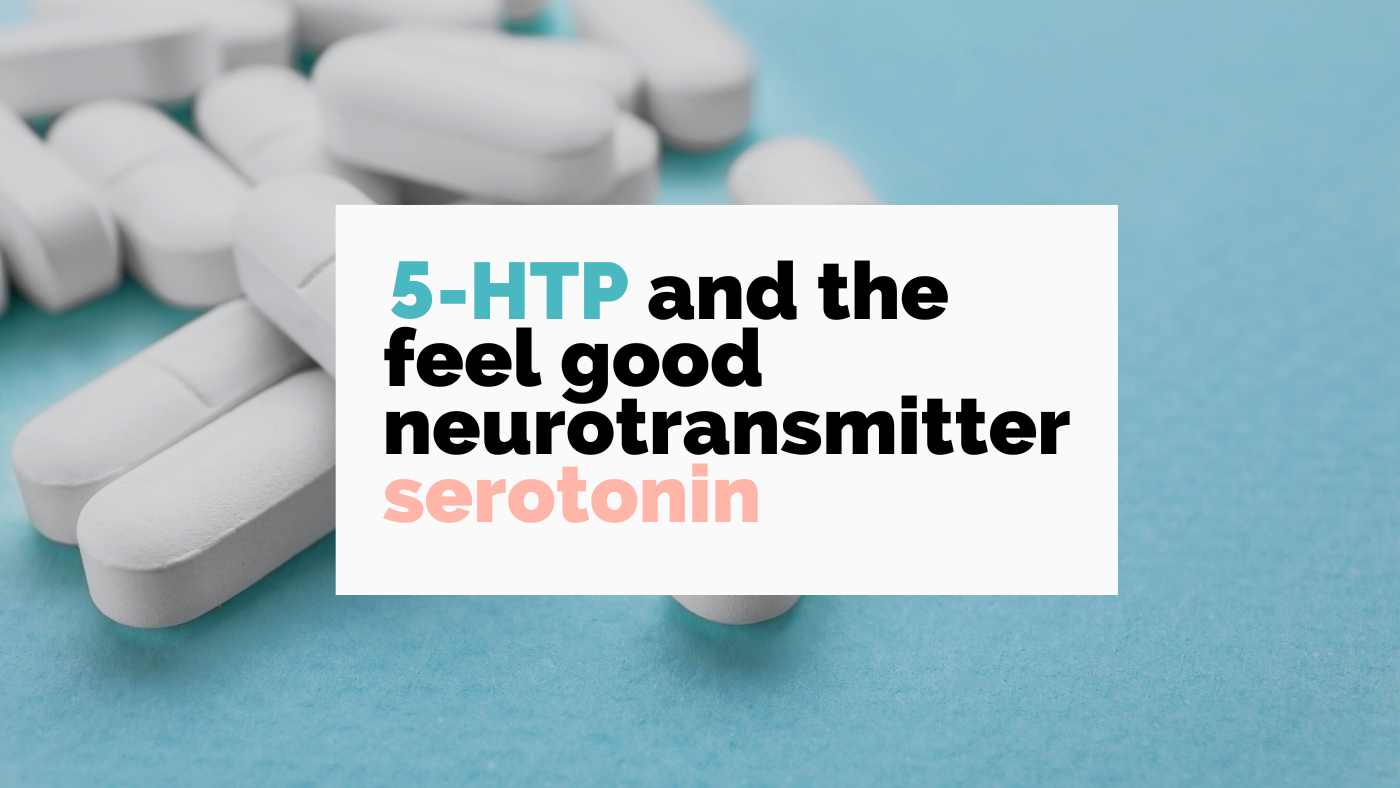
5-hydroxytryptophan (5-HTP) and the “feel good” neurotransmitter serotonin
- 4 ways your child may not tolerate cow’s dairy: allergy, milk protein sensitivity, cerebral folate deficiency, and lactose intolerance - January 3, 2024
- 5-hydroxytryptophan (5-HTP) and the “feel good” neurotransmitter serotonin - October 4, 2023
- Quercetin supplementation for children: research, safety and efficacy - May 13, 2023
What is 5-HTP?
5-hydroxytryptophan (5-HTP) is a chemical the body makes from tryptophan, an amino acid found in food. After tryptophan is converted to 5-HTP it is converted again, but this time to serotonin. Serotonin is a neurotransmitter that carries messages from the brain to various parts of the body and plays a role in sleep, appetite, digestion, impulse control, PMS, mood, cognition, reward, learning, memory and more. It’s often referred to as the “feel good” neurotransmitter because of its ability to create a sense of happiness or wellbeing.
Appropriate serotonin levels are essential for a healthy brain and normal levels support focus, emotional stability, happiness, and a sense of calm.1 Serotonin has been implicated in depression, anxiety, insomnia, inattention, and nervousness, but not all patients with these concerns have low serotonin levels. Some patients may struggle to convert tryptophan to serotonin due to the slow conversion rate of tryptophan to 5-HTP and the necessity of vitamin B6 for enzymatic activation. This is why low levels of B6 are sometimes associated with mood disorders. Supplemental 5-HTP bypasses the conversion of tryptophan to 5-HTP, accelerating the process and increasing the availability of serotonin.
Tryptophan, 5-HTP, Serotonin and Melatonin – they are all linked!
In the human body, 5-Hydroxytryptophan (5-HTP) is primarily derived from the dietary amino acid tryptophan through enzymatic conversion by tryptophan hydroxylase. After ingestion, 5-HTP is readily absorbed from the gastrointestinal tract and crosses the blood-brain barrier, where it serves as a direct precursor to the neurotransmitter serotonin. The enzyme aromatic L-amino acid decarboxylase (also known as DOPA decarboxylase) catalyzes the conversion of 5-HTP to serotonin (5-hydroxytryptamine or 5-HT). Serotonin can subsequently be converted into melatonin, a hormone that regulates sleep, through a sequence of enzymatic reactions involving N-acetyltransferase and 5-hydroxyindole-O-methyltransferase. Both serotonin and melatonin have various roles in regulating mood, sleep, and other physiological functions. Excess 5-HTP and serotonin are typically metabolized by the liver and excreted through the urine.

SSRIs vs. 5-HTP
Selective serotonin reuptake inhibitors, commonly referred to as SSRIs, are antidepressant medications used to treat depression, anxiety, PTSD and other psychological conditions.2 As their name suggests, they work by inhibiting the reuptake of serotonin, leaving more serotonin in circulation and available for activity.2
Although 5-HTP is also used to increase serotonin, the difference between 5-HTP and SSRIs is notable. 5-HTP supports the production of serotonin by making the raw material more readily available. It bypasses the slow conversion of tryptophan to 5-HTP, rapidly increasing the availability of serotonin. On the other hand, SSRIs inhibit the reuptake of serotonin, leaving more in circulation and available for use. 5-HTP can be used to support serotonin production while individuals wean off SSRIs and in some cases, it’s used in place of SSRIs altogether.
Is there a recommended daily allowance (RDA) for 5-HTP?
An RDA for 5-HTP has not been established since it is not found in food, but studies have used doses ranging from 50mg to 800mg a day in adults.3
Are there food sources of 5-HTP?
5-HTP is not found in food, although tryptophan is. Eating foods rich in tryptophan has not been shown to increase 5-HTP in a significant way. Supplementation is the most effective way to increase 5-HTP. The main source of supplemental 5-HTP comes from the seeds of an African plant called Griffonia simplicifolia.1
Even though increasing tryptophan consumption is not associated with increased 5-HTP levels, it does support healthy serotonin levels. Tryptophan is found in clams, oysters, spinach, eggs, pineapple, plums, bananas, nuts, milk and turkey.
Deficiency:
Depletions in tryptophan or 5-HTP result in low serotonin levels and are associated with depression, anxiety, insomnia, weight gain, delayed gastric emptying, OCD, PTSD, panic disorders, and other mood related problems.
There are two major causes of lower serotonin:
- The body isn’t producing enough serotonin.
- The body isn’t using serotonin effectively.
If the body isn’t producing enough serotonin, 5-HTP can help promote the synthesis of serotonin and bypass the slow process of tryptophan conversion.
Supplemental Considerations of 5-HTP
Since 5-HTP increases serotonin and serotonin impacts the gut, taking too much can lead to digestive issues like nausea, diarrhea, an increased sense of fullness and heartburn. Starting with small doses and increasing over time is a good way to avoid uncomfortable side effects.
At high doses, serotonin syndrome may become a concern. Serotonin syndrome is characterized by “altered mental status, autonomic dysfunction, and neuromuscular abnormalities.”4 Symptoms include agitation, confusion, rapid heart rate, muscle twitching or rigidity, dilated pupils and high blood pressure. In severe cases, seizures, coma and death can occur. Individuals taking antidepressants, especially those that increase serotonin should not take 5-HTP or should use extreme caution due to the increased risk of serotonin syndrome.4
Individuals who have liver disease, diabetes, high blood pressure or are pregnant or breastfeeding should consult with their primary care provider before considering supplementation.
5-HTP in research and in naturopathic medicine
Direct studies on 5-HTP supplementation in children are incredibly limited. However, associations between serotonin, tryptophan, and Autism Spectrum Disorder (ASD) and ADHD are robust, despite some conflicting evidence.
Autism
Several studies have shown a relationship between serotonin and autism pathogenesis in children. Some studies associate low serotonin with numerous features of autism in children, including sleep disturbances, cognition and social impairments, while others note associations between high serotonin and serotonin transporters (SERT) and autism severity.5
In one study, levels of serotonin and SERT were significantly increased in children with autism compared to gender and age-matched controls.5 Moreover, serotonin and SERT levels were correlated with autism severity. Increased SERT may be the result of low SERT binding capacity often reported in children with ASD.5 A defect in the binding capacity of SERT may suggest that serotonin levels in the brain are actually low, despite hyperserotonemia, due to serotonin’s inability to cross the blood brain barrier.5 Elevations in serotonin could also be related to defects in serotonin receptors in the brain, meaning there’s enough serotonin, but an ineffective mechanism for binding and utilizing the neurotransmitter.
Although there is conflicting evidence surrounding serotonin levels and ASD prevalence, there is clearly an association between the two. 5-HTP may be a useful tool for supporting appropriate serotonin levels in the future, although more research is necessary to determine the safety, mechanism of action, and dose as it relates to children.
-
PRODUCT ON SALE
 How to Help Your Child with Constipation – Natural Alternatives to Miralax (E-book)$15.00
How to Help Your Child with Constipation – Natural Alternatives to Miralax (E-book)$15.00 -
PRODUCT ON SALE
 Healing your child from ADHD (E-Book)$15.00
Healing your child from ADHD (E-Book)$15.00 -
PRODUCT ON SALE
 Guilt-free, unbiased information about vaccines. Vaccines Demystified.$199.00
Guilt-free, unbiased information about vaccines. Vaccines Demystified.$199.00
Sleep Terrors
Limited evidence suggests that 5-HTP may be helpful in reducing sleep terrors in children.7 After ingestion 5-HTP can cross the blood-brain-barrier and convert to serotonin, which in turn can convert to melatonin, improving sleep quality. Some studies suggest that 5-HTP can improve sleep architecture by increasing the percentage of rapid eye movement (REM) sleep. REM sleep is one of the deepest phases of sleep and is crucial for cognitive functions like memory consolidation and emotional regulation. 5-HTP might reduce the amount of time it takes to fall asleep (known as sleep latency). This could be particularly beneficial for people who have trouble falling asleep.
It is extremely important to note that increasing serotonin levels in some children may actually worsen sleep terrors. Children who complain of excessively vivid dreams should not be given 5-HTP or any serotonin-supportive supplement. It is also important to note that patients who experience vivid dreams should also avoid or reduce their dose of melatonin. As melatonin and serotonin are linked (see the pathway listed above), vivid dreams is one of the first signs of excess serotonin.
ADHD
Tryptophan and its metabolites, 5-HTP, serotonin, and melatonin have been implicated in numerous conditions, including depression, mood disorders, ASD, and ADHD.6 Although the underlying mechanism between tryptophan and ADHD remains unclear, studies suggest a disruption in the tryptophan pathway in children with ADHD, as evidenced by alterations in most of its metabolites (including 5-HTP).6 In the future, tryptophan metabolites may be useful biomarkers of ADHD since they are often present before behavioral symptoms arise.
Other research – anxiety, depression, migraines, Alzheimer’s, Parkinson’s and more!
While there are many studies on 5-HTP in adults, the research is extremely limited in children.
In adults, 5-HTP has been successfully used in the treatment of depression, anxiety, dystonia, panic disorders, sleep disorders, migraines, ataxia, Alzheimers, Parkinson’s, obesity, inflammation and stress. Interestingly, one study suggests that a supplemental tryptophan-enriched diet or 5-HTP supplementation improves social cognition.8 This could have broad implications for children on the autism spectrum or children who have difficulty in social situations. This study also shows greater degrees of confidence, improvements in impulse control and reduced aggression in adults on the supplemental diet.
We can theoretically expect 5-HTP to have similar effects on children as it does on adults with neurological and metabolic disorders, but additional research is required to draw clear conclusions and support for its use in children. Since the main application of 5-HTP is to support serotonin depletion, it may be a possible alternative to the use of SSRIs in the future or in conditions associated with low serotonin.
Is 5-HTP supplementation safe in children?
The million dollar question is on the safety of 5-HTP supplementation in a pediatric population. Again, safety studies in 5-HTP are significantly lacking. A proposed dose of 5-HTP in children is 5 mg/kg/day, often given in divided doses. However I cannot find good supportive evidence for this dosing strategy, except that this would be on the high-end of normal for an adult dose. I would recommend starting significantly lower, more in the realm of 1 mg/kg/day and increasing to 2.5 mg/kg/day if benefit is not found at the lower doses.
This naturopathic doctor’s opinion
I feel comfortable dosing 5-HTP in a verbal pediatric population who can adequately communicate the early signs of serotonin syndrome. These early signs include vivid dreams (first sign), anxiety, agitation, restlessness, and even a worsening of insomnia. Children with MAOA or COMT single nucleotide polymorphisms (SNPs) very frequently have paradoxical responses to 5-HTP. I would use extreme caution in this patient population, or in patients prone to violent outbursts or anger.
In my practice I use 5-HTP lozenges as a trial for some children struggling with ADHD, insomnia and depression. I use 5-HTP in school-age and adolescent children who have good communication skills. I always let children self-select to whether they want to continue a sample trial of a 5-HTP lozenge, as children are quite good at telling whether a substance helps their nervous system or worsens it. In some cases kids will even say a lozenge “doesn’t taste good,” when they really mean it doesn’t make them feel good.
I recommend considering 5-HTP as an alternative to SSRI’s in adolescent children struggling with depression and anxiety. 5-HTP can be combined with SSRI’s but should be done with extreme caution as the risk for serotonin syndrome increases dramatically. 5-HTP is a nice addition to treatment-resistant depression, or for children with depression who also have poor protein intake and we presume low tryptophan levels.
It is also important to note that 5-HTP and P5P (pyridoxine-5-phosphate or vitamin B6) go together extremely well, as P5P is the cofactor needed for conversion of 5-HTP to tryptophan. B6 supplementation is challenging in a pediatric population, as it has an unfavorable taste. Children who can swallow capsules may be able to try P5P, but make sure to supplement on a full stomach as nausea can occur.
And, as always, 5-HTP is only one tool in a robust naturopathic toolbox for neurological considerations. Addressing diet, body movement (exercise), social circumstances, stress, counseling, etc, are incredibly important for a whole-person approach to mental health. For more information check out our article Nutritional Interventions for Depression and Anxiety in Children.
-
 Physician Resources – Charting Templates 5 years to 10 years$39.00
Physician Resources – Charting Templates 5 years to 10 years$39.00 -
 Physician Resources – Charting Templates 15 months to 4 years$39.00
Physician Resources – Charting Templates 15 months to 4 years$39.00 -
 Physician Resources – Charting Templates Newborn to 12 months$39.00
Physician Resources – Charting Templates Newborn to 12 months$39.00
Summary:
When we eat foods containing the amino acid tryptophan, it’s converted to the chemical 5-HTP and later to serotonin, the “feel good” neurotransmitter. Normal levels of serotonin promote focus, emotional stability, happiness, a sense of calm and impact numerous body functions like digestion, cognition and sleep. 5-HTP is not found in food so supplements are the best way to optimize intake. However, supplements should be used with considerable caution, especially in individuals taking antidepressants due to the risk of serotonin syndrome.
The research on 5-HTP in adults is widespread and promising, while the research on children is quite limited. Some studies indicate an association between the tryptophan, 5-HTP, serotonin pathway and children with Autism Spectrum Disorder and ADHD, but the results are often conflicting and inconclusive. In adults, 5-HTP is used to manage a variety of neurological and metabolic disorders. Theoretically, 5-HTP would have a similar effect on children by increasing serotonin and improving associated functions like cognition, emotional stability, digestion and sleep.
References:
- Mount Sinai. 5-Hydroxytryptophan (5-HTP). Mount Sinai. 2022.
- Chu A, Wadhwa R. Selective Serotonin Reuptake Inhibitors. [Updated 2023 May 1]. In: StatPearls [Internet]. Treasure Island (FL): StatPearls Publishing; 2023 Jan-. Available from: https://www.ncbi.nlm.nih.gov/books/NBK554406/
- Lee Roberta. Anxiety. Integrative Medicine. 2018;4.
- Maffei ME. 5-Hydroxytryptophan (5-HTP): Natural Occurrence, Analysis, Biosynthesis, Biotechnology, Physiology and Toxicology. Int J Mol Sci. 2020;22(1):181. Published 2020 Dec 26. doi:10.3390/ijms22010181
- Abdulamir HA, Abdul-Rasheed OF, Abdulghani EA. Serotonin and serotonin transporter levels in autistic children. Saudi Med J. 2018;39(5):487-494. doi:10.15537/smj.2018.5.21751
- Raghavan R, Anand NS, Wang G, et al. Association between cord blood metabolites in tryptophan pathway and childhood risk of autism spectrum disorder and attention-deficit hyperactivity disorder. Transl Psychiatry. 2022;12(1):270. Published 2022 Jul 9. doi:10.1038/s41398-022-01992-0
- Bruni O, Ferri R, Miano S, Verrillo E. L -5-Hydroxytryptophan treatment of sleep terrors in children. Eur J Pediatr. 2004 Jul;163(7):402-7. doi: 10.1007/s00431-004-1444-7. Epub 2004 May 14. PMID: 15146330.
- Zamoscik V, Schmidt SNL, Bravo R, Ugartemendia L, Plieger T, Rodríguez AB, Reuter M, Kirsch P. Tryptophan-enriched diet or 5-hydroxytryptophan supplementation given in a randomized controlled trial impacts social cognition on a neural and behavioral level. Sci Rep. 2021 Nov 4;11(1):21637. doi: 10.1038/s41598-021-01164-y. PMID: 34737364; PMCID: PMC8568973.








